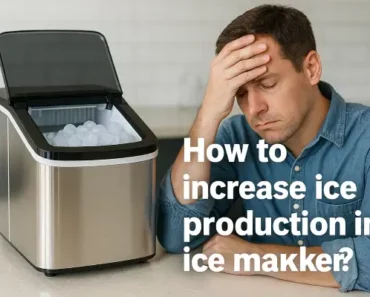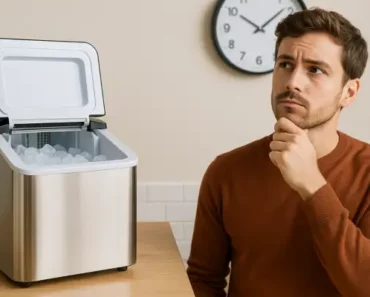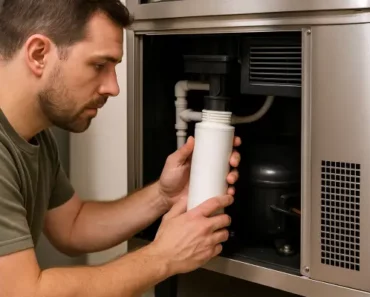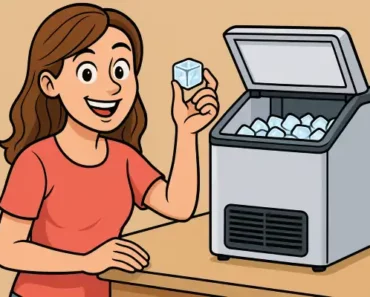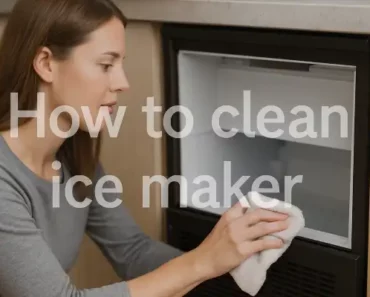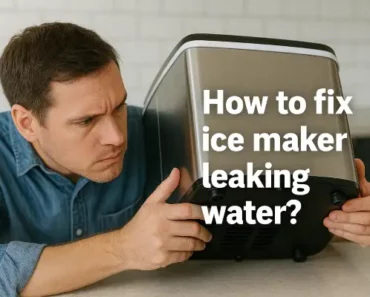What happens if you don’t turn off the ice maker is a very strange question from my readers, asking Ice Artisan if they can completely forget their ice maker when going on vacation. Well, I wrote an article of “Can ice makers be left running all the time?”, which somehow tell you should or shouldn’t leave an ice maker running all the time. But this time, you will want to know what really happens if you don’t turn off the ice maker, right?
I’ve made a comprehensive “Ice Maker FAQ” series collecting all common ice maker problems to help Ice Artisan readers quickly troubleshoot their ice maker units.
- ⚖️ Countertop vs undercounter ice makers
- 👍 Are portable ice makers worth it?
- ⚡ How much electricity does an ice maker use?
- 💧 Does an ice maker use a lot of water?
- 🪣 Do ice makers need to be drained?
- 🚫 Can ice makers cause water damage?
- 🚰 Do ice makers need water lines?
- 🔊 Are countertop ice makers loud?
- 😭 Do ice makers make a lot of noise?
- 🔗 Are countertop ice makers safe?
- ⛺ Can ice makers be used outdoors?
- 🔌 Can ice makers be left running all the time?
- 🚗 Can ice makers be used in RV?
- 🗄️ Can ice makers be installed in cabinets?
- ❄️ Do portable ice makers keep ice frozen?
- 🛠️ Can ice makers be used in garages?
- 📄 Do ice makers store ice?
- 🚀 How do ice makers make ice so fast?
- 💡 How does ice maker work?
- 🎰 How does a commercial ice maker work?
- 🛠️ How to install an undercounter ice maker?
- ❄️ How to make clear ice in ice maker?
- 🪣 How to increase ice production in ice maker?
- ⏳ How long does an ice maker take to make ice?
- 🔗 When to replace ice maker filter?
- ⏱️ When to replace ice maker?
- 💡 How to clean ice maker?
- 😭 Why does my ice maker smell bad?
- 🫗 How to drain an ice maker?
- 🪣 How to unclog an ice maker?
- 🔗 How do I unstick my ice maker arm?
- 💧 How to fix ice maker leaking water?
- ❄️ Why is my portable ice maker making too much ice?
- 🥵 Why is my ice maker hot?
- 🔌 What happens if you don’t turn off the ice maker?
- 🧊 How to fix ice maker not making ice?
Ice Artisan‘s best picks
What happens if you don’t turn off the ice maker?
Depending on the ice maker you are using (countertop or undercounter ice maker), what exactly happen are largely the same, but on different level. Commercial ice makers are meant to last longer, so they may somehow have the same effect as the countertop ice makers, but at a lesser extent.
A countertop ice maker is particularly vulnerable to continuous operation. It is only using air-cooled ventilation for its cooling system, and running continuously put a heavy mechanical stress on its crucial components, like the compressor.
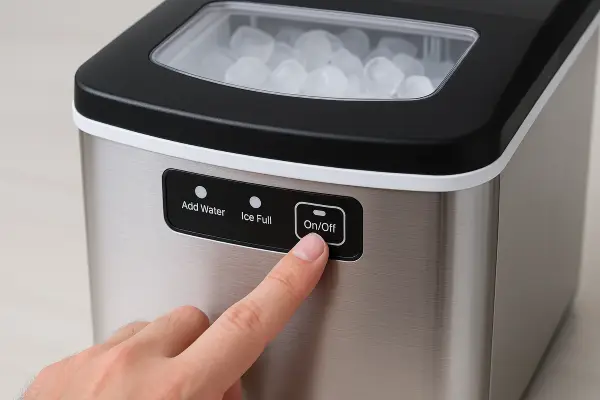
It doesn’t work like the refrigerator in your kitchen, and its bin doesn’t have good insulation to store ices for long. Soon the ices will melt and the process of ice making continues, which destroy your electricity bill when you’re away for vacation.
That isn’t the end of story. Even when the countertop ice maker has a sensor, it is not good if you rely completely on it. As a result, some ice makers will leak water that can cause water damage the whole appliance, as well other nearby appliances that’s connected to a power outlet. That’s disaster when you come back home.
Finally, the water is repeating the whole ice making process for how many days you’re not touching the ice maker, and it is an ideal condition to inhabit mold and bacteria. Well, more reasons for you to learn how to clean ice maker.
Like I said, everything also happens for the undercounter ice maker. However, because commercial ice makers are meant for continuous ice making, it can withstand longer than the countertop units. It’s far less likely to leak water, because it has its own drainage system, providing that you know how to install an undercounter ice maker firsthand.
So again, I advise my readers to turn the ice maker off, whenever you feel it is unnecessary to use. I know, leaving your ice maker running continuously might seem convenient at first glance, but believe me, the kitchen appliance is never meant for such abuse.

